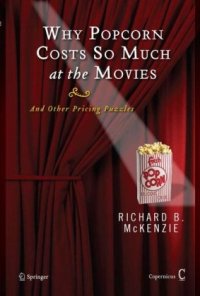
Ebook: Why Popcorn Costs So Much at the Movies: And Other Pricing Puzzles
Author: Richard D. McKenzie (auth.)
- Genre: Economy
- Tags: Economics general, Popular Science general
- Year: 2008
- Publisher: Copernicus
- Edition: 1
- Language: English
- pdf
Why Popcorn Costs So Much at the Movies, And Other Pricing Puzzles unravels the pricing mysteries we encounter every day.
Have you ever wondered why all movies, whether blockbusters or duds, have the same ticket prices?
Why sometimes there are free lunches?
Why so many prices end with "9"?
Why ink cartridges can cost as much as printers?
Why merchants offer sales, coupons, and rebates?
Why long lines are good for shoppers?
Why men earn more than women, around the globe – and why they always will?
Richard McKenzie goes on to show how the 9/11 terrorists still kill Americans every day, because their attack distorted the perceived risks and relative prices of air vs. automobile travel, and jacked up both security costs and flight delays. Professor McKenzie also explores the unintended consequences of well-meaning efforts to spur the use of environmentally friendly fuels: starvation among millions of people around the world, and the destruction of rainforests in Malaysia and Indonesia.
How can these things be? If you think you know the answers, think again. Why Popcorn Costs So Much at the Movies, And Other Pricing Puzzles shows you that the real reasons are sophisticated and surprising – and in Professor McKenzie’s hands, both informative and entertaining.
You won’t need a degree in economics to enjoy this fascinating book, just an armchair and an inquiring mind.
"This is one of the very best books on pricing. If you are looking to understand the economics of the world around you, you can do no better than to start here."
Tyler Cowen, George Mason University; economics blogger of "www.marginalrevolution.com"
"Truly liberating. Using a series of fascinating enigmas we’ve all encountered in our daily lives, Richard McKenzie reveals how the real economic world works. Highly readable. Extraordinarily enlightening."
W. Michael Cox, senior vice president and chief economist at the Federal Reserve Bank of Dallas
"Anything we think about every day is important. And who goes a day without thinking about prices? But prices are more important than most people realize. If you are interested in reducing pollution from cars, or not being fooled into paying too much, or too little, for products, or in just getting the best deal on popcorn at the movies, you will benefit from knowing more about prices than most people do. And there is no easier, or entertaining, way of finding out more on how and why prices are important than by reading McKenzie's fascinating book Why Popcorn Costs So Much at the Movies, And other Pricing Puzzles. And are people really fooled by all those prices that end in 99 cents? You'll be surprised."
Dwight Lee, University of Georgia
Why Popcorn Costs So Much at the Movies, And Other Pricing Puzzles unravels the pricing mysteries we encounter every day.
Have you ever wondered why all movies, whether blockbusters or duds, have the same ticket prices? Why sometimes there are free lunches? Why so many prices end with ''9''? Why ink cartridges can cost as much as printers? Why merchants offer sales, coupons, and rebates? Why long lines are good for shoppers? Why men earn more than women, around the globe – and why they always will?
Richard McKenzie goes on to show how the 9/11 terrorists still kill Americans every day, because their attack distorted the perceived risks and relative prices of air vs. automobile travel, and jacked up both security costs and flight delays. Professor McKenzie also explores the unintended consequences of well-meaning efforts to spur the use of environmentally friendly fuels: starvation among millions of people around the world, and the destruction of rainforests in Malaysia and Indonesia.
How can these things be? If you think you know the answers, think again. Why Popcorn Costs So Much at the Movies, And Other Pricing Puzzles shows you that the real reasons are sophisticated and surprising – and in Professor McKenzie’s hands, both informative and entertaining.
You won’t need a degree in economics to enjoy this fascinating book, just an armchair and an inquiring mind.